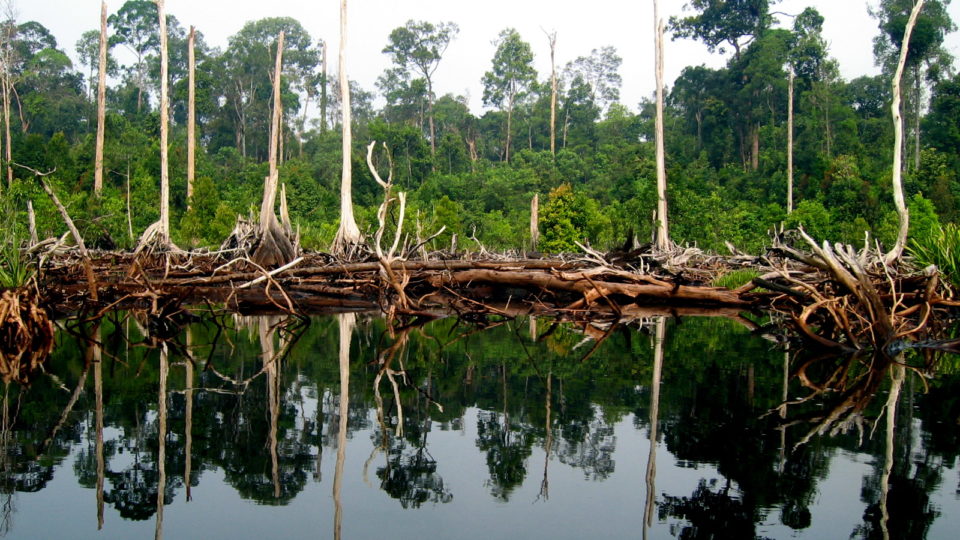Jakarta, May 2, 2017 – In 2015, devastating forest and peatland fires occurred in Indonesia, impacting public health, economy and the environment. Peatlands become prone to fire when they are drained – typically for palm oil and Acacia pulpwood plantations as well as small scale agriculture. Drainage-based land-use on peatlands may be first productive but becomes unviable as the soil degrades and evaporates in the form of greenhouse gases, causing soil subsidence and flooding with loss of productivity as an inevitable long-term result.
In response to these problems, Wetlands International Indonesia today launches the Indonesian Peatland Partnership Fund /”Dana Mitra Gambut Indonesia (DMG-Indonesia)”, a funding programme for community-based peatland conservation, restoration and sustainable development. The fund is issuing a “Call for Proposals” for local Civil Society Organizations (CSOs) that partner with local communities to implement peatland conservation and restoration within five focal provinces.
The fund aims to support the Indonesian government’s programme about addressing the destructive peat fires in Indonesia. In 2016 President Joko Widodo established the Indonesia Peatland Restoration Agency (BRG), tasked to coordinate and facilitate the restoration of approximately 2 million hectares of peatland by 2020, with a focus on 7 provinces.
“This initiative will provide small grants for community-based projects to restore peatlands and make them locally productive, whilst helping to reduce fire risks and GHG emissions,” said I Nyoman Suryadiputra, Director of Wetlands International Indonesia. “Community ownership and community businesses based on sustainable peatland utilisation and management is key to successful peatland restoration”, he added.
DMG-Indonesia will coordinate closely with BRG and the Ministry of Environment and Forestry (KLHK). Project implementation will focus on 5 out of the 7 government focal provinces, namely Riau, Jambi, South Sumatra, West Kalimantan and Central Kalimantan. “We welcome DMG-Indonesia activities, because efforts to accelerate peatland ecosystem restoration need to involve multiple parties, not only central and local governments, but also CSOs, as targeted by the DMG-Indonesia,” said Nazir Foead, Head of BRG.
“Around 1 million hectares of peatland in BRG priority areas can be utilised for the welfare of communities,” said Erna Rosdiana, Director of Environmental Partnerships at the Ministry of Environment and Forestry (KLHK). “Environmental partnerships play a key role in raising the collective awareness on peatlands that are managed by communities and related stakeholders in conserving and restoring peatland ecosystems, in order to balance people’s needs and well-being with the sustainability of the ecosystems on which their livelihoods depend” Erna added.
DMG-Indonesia grant allocations will be advised by a Steering Committee comprised of BRG, KLHK, and civil society organizations concerned with peatland conservation and environment. Grants will be to a maximum of Rp. 300 million, with a maximum period of 24 months. “Additionally to the small grant funding, DMG-Indonesia will provide support to building the capacity of grantees, involving training on how to manage projects accountably, on peatland technical issues and awareness raising,” explained Nyoman Suryadiputra. “DMG-Indonesia will stimulate and support peatland conservation and restoration, serve as a communication forum and advocate for sustainable peatland management in Indonesia,” he added.
DMG-Indonesia is designed to contribute to sustainable peatland management, to enhance livelihoods for local people who are dependent on peatlands, while contributing to government efforts in restoring peatlands in Indonesia. Project activities also will support collaboration with neighbouring land-users, such as companies and conservation area or ecosystem restoration concession managers, to create win-wins for stakeholders in various sectors, as part of sustainable peat landscape management.
Funding will be distributed in three categories, as follows:
- To support projects in community-based peatland conservation and restoration, including rewetting, paludiculture; REDD+ activities (e.g. community based carbon credit opportunities); prevention of peatland fires. The community-based activities should contribute or be complementary to Indonesian government plans and actions.
- To support innovative community-based business development that will offer tangible ‘models’ that provide feasible opportunities for up-scaling and embedding in sustainable (economic) development plans.
- To improve community tenure related to peatland (e.g. hutan desa), as part of land-use and business planning.
The first call for proposals is open from 2 May – 7 July 2017, eligible for Civil Society Organizations that partner with local communities. More information and grant application forms can be accessed at: https://indonesia.wetlands.org/id/publications/DMG-indonesia/
For more information, please contact:
- Yani Saloh, Fund Manager ([email protected])
- Bas Tinhout, Project Manager ([email protected])
Editor’s Note:
Wetlands International
We are a global not-for-profit organisation dedicated to the conservation and restoration of wetlands for people and nature, and active in Indonesia since 1986. Wetlands are the source of water that support all forms of life. Despite many efforts to promote their conservation, loss and damage to wetlands and their biodiversity continues. In Southeast Asia, 90% of all peatlands are degraded. Our vision is a world where wetlands are treasured and nurtured for their beauty, the life they support and the resources they provide.
Link to our Indonesia office website: https://indonesia.wetlands.org
Paludiculture
Paludiculture is the cultivation of native wetland species that are adapted to wet conditions, and deliver economically valuable products and services. Examples are: sago (Metroxylon spp.) for the production of noodles, purun grass (Eleocharis dulcis) for basketry, tengkawang (Shorea spp.) which produces edible oil, jelutung (Dyera spp.) which produces natural rubber, rattan (Calamus rotang) for basketry and furniture. Paludiculture on rewetted peatlands restores the natural hydrology of peatlands, stops carbon emissions and subsidence and prevents fire and flooding.
https://indonesia.wetlands.org/id/publications/prospek-paludikultur-di-ekositem-gambut-indonesia/
Business as usual on peatlands
Current business as usual on peatlands requires drainage which dries out the soil. Peatland drainage causes oxidation of the peat soil leading to disproportionally high GHG emissions, fire risk and peatland subsidence. In 2015, the yearly returning fires caused a haze crisis hospitalizing tens of thousands of people. Losing the peat carbon to the atmosphere leads to peatland subsidence and progressive undrainability, flooding and production loss, threatening millions of hectares of peatlands to become wastelands in the future.

